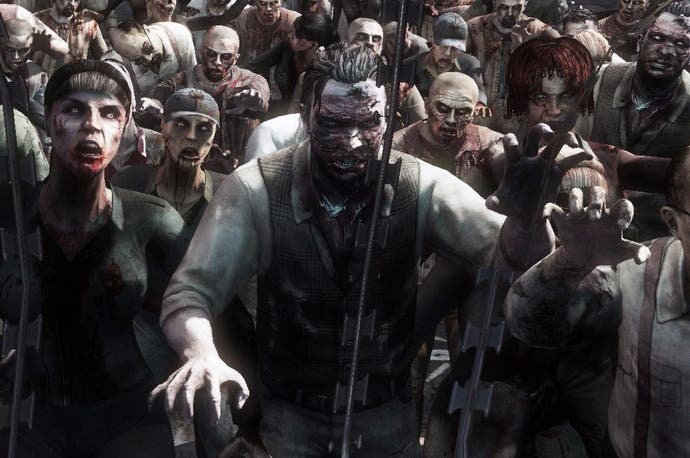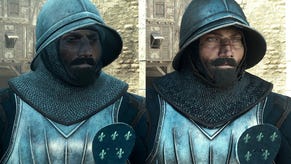The man behind one of Steam's most controversial games is back
The War Z's Sergey Titov has a new game, but can he shake his troubled reputation?
There are few video game developers who are treated with as much skepticism as The War Z executive producer Sergey Titov.
His zombie apocalypse MMO-shooter/DayZ clone launched to dreadful reviews by critics and players alike, but that was the least of its problems. Its Steam page promised features that hadn't yet been implemented. Titov offered an oft ridiculed apology for this where he downplayed the false advertising as players "misreading" the game's description. This was followed up by the developer announcing two more games (Romero's Aftermath and the just released Shattered Skies) that looked eerily analogous to his infamous flop. Unsurprisingly, Titov's name wasn't a selling point on any of these games, yet sleuths discovered his fingerprints popped up on a total of four enigmatic companies behind these seemingly similar titles. It all seemed more than a little sketchy.
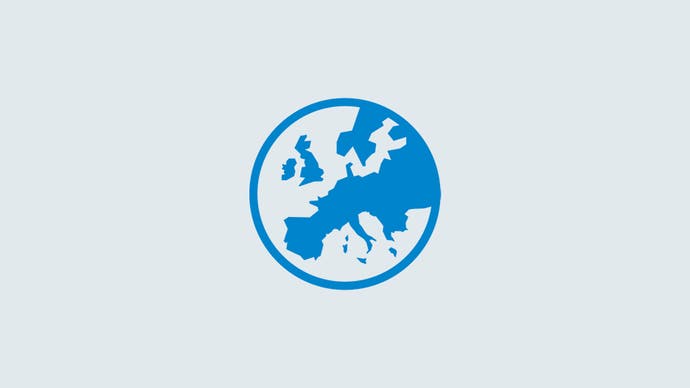
Yet Titov is adamant he's grown a lot since the unpleasantness of The War Z's launch dragged his name through the mud. To explain his side of the story, Titov offered us a no holds barred interview about, well, pretty much everything; the backlash against his former games, the criticism against him personally, and why anyone should believe him going forward.
So let's start with the musical chairs of company monikers. Titov's last few titles were attached to a convoluted collection of companies all bearing Titov's mark. The War Z was developed by Hammerpoint Interactive and published by OP Productions. Romero's Aftermath and Shattered Skies are both developed and published by a new company called Free Reign Entertainment that is itself part of another cryptic holding company, Arktos Entertainment Group LLC.
All four organisations cast Titov in an important role, yet the newer companies never acknowledge Titov by name on their websites, nor do they explain his professional history. At a distance, it looks dodgy. Like he's constantly erecting new companies so people won't know who's behind his recent products.
"That's basically exactly a perception that exists, but we never actually tried to hide the fact that I'm involved or that some other developers from our team are involved in these games," Titov tells me over Skype. "We didn't hide it. It was always there on a press release, or website, or on the forum."
That's not exactly true, I tell him. In fact, it's pretty difficult to find this information. The trailers for Shattered Skies link back to the game's website, but say nothing of Free Reign or the developer's previous work.
The studio's name is buried in the legal section of the Shattered Skies site and even the official Free Reign site doesn't mention Titov by name or feature an "about us" section. Unless someone really does a lot of digging, the fact that Shattered Skies and The War Z were created by the same developer is as obfuscated as it gets.
Titov doesn't see it this way. He claims The War Z isn't mentioned because it's a property owned by that game's publisher, OP Productions. "If you google [Free Reign] you will find out very quickly everything you want to find," Titov says. "I'm not sure why we should put on the front of the Shattered Skies website anything about The War Z, especially given the fact that we don't even have rights to War Z."
"But frequently there's an 'about us' section explaining a developer's pedigree," I counter.
"Well, if people go to Free Reign [official site] they will find out about Aftermath," he says.
He is right that a studio isn't obligated to explain its past. There's no law requiring it. But given Titov's history and the similarities between Shattered Skies and The War Z, it looks fishy for a company to change names and not offer any information about its credentials.
Finally, Titov offers an explanation so reasonable it's shocking he didn't mention it earlier: 80 per cent of Shattered Skies' development team didn't work on The War Z.
To break it down, Titov clarifies that The War Z was developed by a team of about 40. Shattered Skies' dev team is roughly 20, with only four of its staffers (including Titov himself) involved with The War Z.
It's a valid point, but doesn't clear up everything. What about the confusing list trail of companies?
As it turns out, Titov offers a surprisingly sensible explanation for this convoluted corporate web, too. Here's the breakdown: OP Productions was a publisher that came together specifically to produce The War Z. It had five board members; one of which was Titov. The others were from outside the video game industry. Separate from that, there was the game's developer, Hammerpoint Interactive. This was Titov's private company. Since he was the only member of the OP Productions board who was actually working on game development, he became the face of The War Z.
Once Hammerpoint neared the end of its tenure on The War Z, Titov decided to go independent. He wanted his next game to be self-published, without the mixed blessing of funding and control that came with working under OP Productions (where Titov had less of a say, splitting his vote with industry outsiders). To this end, he shuttered Hammerpoint - which was actually part of Titov's slightly larger financial entity, Arktos Entertainment - and established Free Reign Entertainment.
Still with us?
"At some point it's become clear that Arktos as a developer, who's facing customers and community, just don't have enough influence on decisions regarding what will be happening to the game," Titov explains. "So we parted our ways with OP Productions." This happened in 2014.
Yet even though Titov could pass the blame onto his fellow board members at OP, he doesn't. "To be honest, I don't want to go into finger-pointing and saying 'oh, that was the bad guys. They did that.' From my perspective it's very simple: I was the public face of the project. So from that standpoint, whatever happens behind the curtain - who makes a decision or doesn't make a decision - if I voiced this decision or supported this decision in public eyes, that's on me," he admits.
"It's not like somebody set a gun to my head and said, 'do that'," he acknowledges. "The other guys were like licensing guys from Hollywood, or financial guys, or even retailer guys. So it was like, 'oh let's do this to the game', or, 'let's make more money on micro-transactions because everybody loves that'. Our mistake as developers was to say, 'oh, okay, let's try it'."
"It was a product," Titov states, coldly, of The War Z's practical origins. "It was based on DayZ hype. And we thought we could make a game better - and I think we did make it better than the DayZ mod at least."
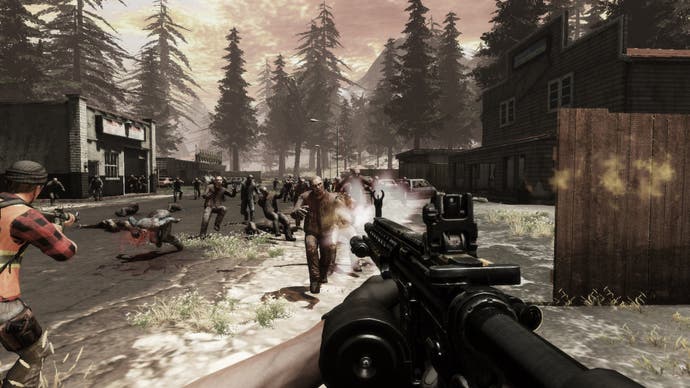
There is one specific PR blunder Titov does blame his fellow board members for: The War Z's erroneous Steam page that promised existing features that were only planned to be implemented later down the line.
"The Steam release - that was actually on the people at OP Production," Titov laughs. "I said I'm not going to blame them, but I do blame them for that."
He also casually notes he was concerned about OP's convoluted business arrangement. "Even when we started I said, 'guys, this is too complicated for most people to understand.' But lots of people who were involved in the deal they said, 'oh no, dude. That's how it's done in the movies. There's usually five, six, seven legal companies involved. That's fine. Let's do it.' And I was like 'oh f*** that,' " he chuckles.
Titov, though, holds his hands up when it comes to his stubborn apology wherein he dismissed criticism of false advertising as a "misreading."
When asked if this was some kind of translation issue for the Russian-born developer, he replies: "It wasn't a language barrier. I actually meant what I said back at the time.
"That's another thing that I learned. That was my extreme arrogance so to say. I actually relied on the data we'd been getting from the game. Maybe it's not [a] language barrier, but more of my more mathematical type of the mind... I'd basically been looking at the numbers and saw sales were going up. Daily active users are going up. Those guys who are bitching, they are crazy! Hopefully I'm not that arrogant anymore. That was one of my shortfalls back at the time."
His line about his "mathematical mind" makes more sense when one considers his background. Raised in 1980s Russia before emigrating to Los Angeles about a dozen years ago, Titov got into the video games industry from a tech background.
"I'm a programmer. I come in from the coding side," he tells me. "It was [in the] mid '80s when I first got access to personal computer and wrote my first text-based basic game. But I was more on the programming side. Not on the art, not on the design.
It may surprise some to learn that prior to his stint on The War Z, Titov worked at Riot Game from 2006-2008 where he served as a technical director on League of Legends before that game's launch. When asked why he left Riot, Titov says that MOBA's weren't his passion.
"I left Riot mostly because I didn't really liked genre," he tells me. "I'm not a Dota fan, so at some point I realised that I will most likely slow down [the] company's progress comparing to someone who will be way more interested in [the] game itself. Riot have [a] unique culture - something I've never actually seen before, but it's pretty much [a] place for people who are very invested in a genre and [the] game itself. It wasn't me. I love shooters."
"Basically I firmly believe that game development is hard enough, so if anyone in a team doesn't fully love what they're doing, they should step down. So everyone should be aligned with each other, and be fully dedicated - and by that I mean not only professionally, but on more personal level too."
"At some point, I wanted to stay in game development, but I wanted to stay more in technology development and engine writing," he explains. "But over the course of years it's all transformed and now I'm doing more business-side production than anything else. I haven't touched code in the last five years."
It's a revealing statement that adds perspective to the whole The War Z blunder. Titov may not have the business acumen to be a knowing swindler, nor is he as adept at game design as the usual head of a developer. He's a middle-aged tech man from a drastically different culture. Is it any wonder his PR skills were out of touch?
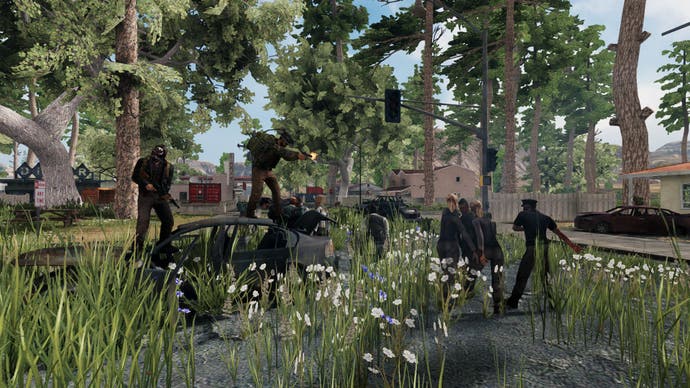
Titov says he views the whole ugly episode as a learning experience, and he's proud of how far he's come with Shattered Skies, which just arrived on Steam last week.
Described as the "ultimate survival looter shooter," Shattered Skies is a persistent open-world game with PvP and co-op options as players survive an apocalyptic world ravaged by aliens. It seems very much in keeping with Titov's previous efforts, though this one has been noticeably better received by the community. As of publishing, the game has 591 positive user reviews on Steam compared to 346 negative and the lion's share of the "most helpful" posts have recommended Free Reign's latest stab at this emergent genre.
"From what we are seeing, Aftermath was generally received better than The War Z," Titov says. "So people were saying, 'okay, you basically upgraded The War Z experience for Aftermath.' Going into Shattered Skies, they actually say, 'okay, we actually have a much better experience, much better graphics, much better everything in Shattered Skies compared to Aftermath.' So for us as developers it's like, we made [a] game, then we made a better version, now we're making a vastly better version."
One of Shattered Skies' selling points is its complete lack of micro-transactions. Instead, you buy the game once and it's yours forever. There is one catch: players can buy different editions of the game that come with XP bonuses and more storage slots. Players can even upgrade from one kind of account to another. To me, this is still a pay-to-win micro-transaction, I tell him.
"That's the first time I've heard that, about pay-to-win," Titov says. "I wouldn't call it an advantage - but [a premium account] gives you only one gameplay feature that you cannot acquire in-game: the size of your persistent storage. And that decision was made based on the data we had from our previous games.
"So think about it this way: if you are a casual player and you play like five, 10, 20 hours a week, then you really don't need huge persistent storage. You won't fill it up at all. But if you are playing more and more hours and playing for longer periods of time, then you'll probably fill out your global storage units pretty fast and you'll need a bigger storage.
"So for us it's not pay-to-win or giving an advantage. When you start the game for the first month or two, there is really no difference between the starter package and most advanced package. Your XP bonus will give you small bump in how fast you progress, but that will only work for the first couple of days of playing.
"Outside of that, [an] advanced account gives you a couple of cosmetic items not attainable in-game. But, at the same time, those cosmetic items are super flashy, so if you are wearing them all the time you'll become a much easier target for other players. So that's actually a disadvantage for players."
But isn't that still a micro-transaction, I ask? You're still spending real world money to gain extra storage, after all.
"I disagree with that. Lots of retail games sell where you pay one price and you get some of the items in higher-priced packages. Like different editions of the game. So that's exactly that. I wouldn't call it micro-transactions. For most people they think about micro-transactions as something that's recurrently happening in the game over and over and over. Gaining items on an ongoing basis. That's not what's going on here."
"Tens of thousands of people got exposed to the game and we literally never heard the complaint that upgrading to different types of accounts is a micro-transaction or an unfair advantage or anything like that."
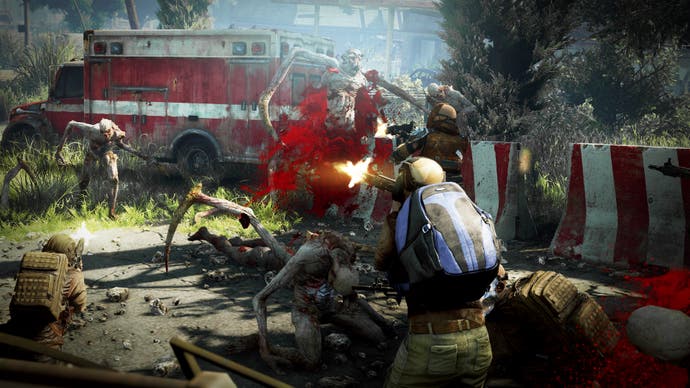
It's a fair point, and indeed the payment model for Shattered Skies is more palatable compared with those used for Titov's previous games. Paying once and having unlimited access is a structure that appeals to a lot of people turned off by micro-transactions. But the harder part then becomes, how do you convince people to buy your game? Especially if both The War Z and Romero's Aftermath were poorly received?
Titov disagrees with this last bit. He understand that Steam reviews for Aftermath are mixed at best, but he believes they don't tell the full story. "Steam is not 100 per cent of userbase," he says. "For Infestation, Steam was about one third. For Aftermath, Steam was about 50 per cent." He claims that the most supportive players are early adopters who come before the game even comes to Steam.
He further believes that a lot of the negative Steam reviews came from people holding a grudge against him for The War Z. "I would say 70-80 per cent of them are basically people who didn't like the game. About 30 per cent of them are because people didn't like us," he says.
"They said 'oh, those motherf*****s did that with The War Z, so that's why this game sucks.' From my perspective, Aftermath had its own good player base of people who liked the game - but again, it's not for everyone. It's also a free game, so you can download it on Steam, leave a negative review and not even play the game."
Titov finds this sort of skepticism frustrating, but not unfounded.
"Is the reason we get negative reviews the same reason Call of Duty gets negative [Steam] reviews? Of course not! Part of that is very valid from my perspective," he says.
"Because of the things we did with The War Z, which didn't work well with players, they have this grudge. But to be honest, that's their right! They should have this grudge! It's okay. That's why we're saying, look at our new game. Look at what people are saying. Look at the videos and decide for yourself if you want to play this game or not. It's not like we're saying we're going to completely hide who made this game. We are saying we did it! It's our third game! If you like it, play. If not, that's fine."
It's a good answer that's a far cry from the arrogant Titov who became something of a pariah in 2013. But Titov can never escape the past completely. The internet sometimes forgives, but it never forgets. "How do you feel when you go online and see a bunch of people saying terrible things about you?" I ask.
"Oh, it still bothers me," Titov is quick to reply.
"At the same time I've kind of accepted that that's the modern internet. So I kind of became a public figure. And not everything you hear about public figures is true. But yeah, it hurts, obviously. But it was in some way my decision to become this public face for the game.
"It's hard for me to say, 'oh, you guys are so unfair. I'm a good guy', and everything. Even if I feel that, it was my decision to become a public face and that's a consequence of that."
